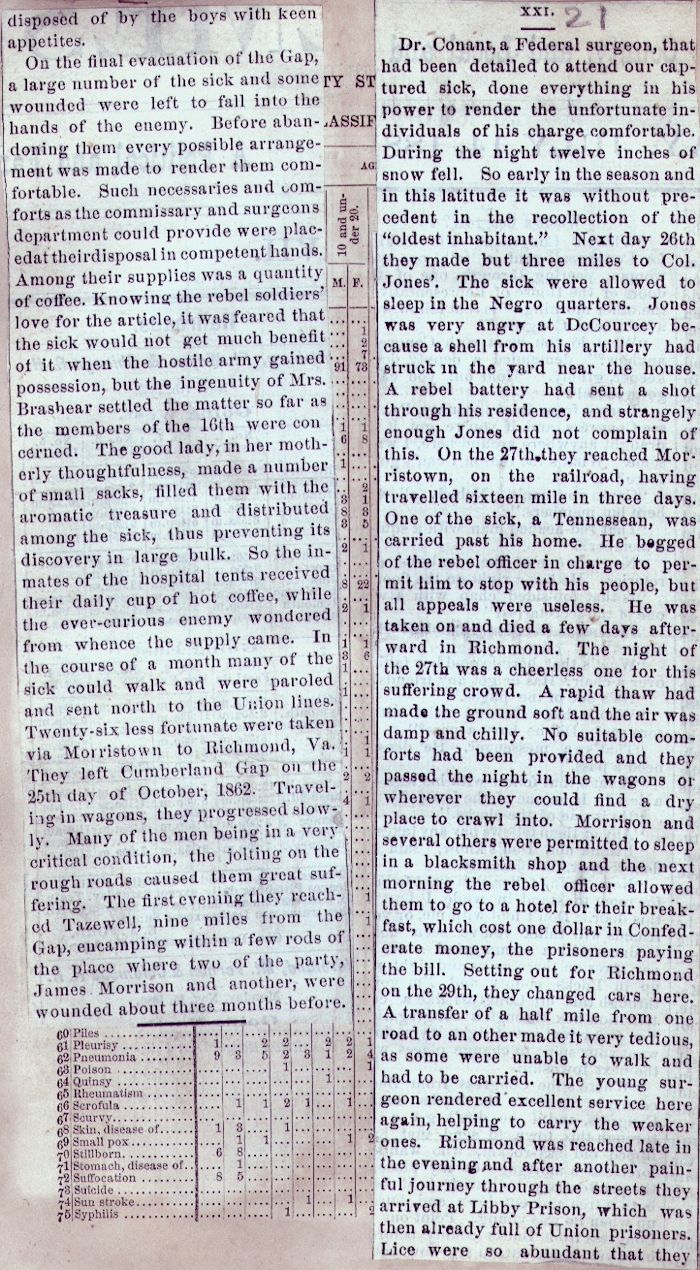| Camp & Field Page 35 | Camp & Field Index Page | 16th OVI Home Page | Camp & Field Page 37 |
The Camp & FieldArticles by Theodore Wolbach |
 Cpl. Theodore D. Wolbach |
The following image is taken from a book titled "Mortality and Statistics of the Census of 1850" in which it is believed retired Captain Rezin H. Vorhes, Company H, pasted over the pages a series of articles written by Cpl. Theodore D. Wolbach, Company E, titled "Camp and Field" and published, by chapter, in the Holmes County (Ohio) Republican newspaper from February 24, 1881 to August 17, 1882. The articles tell the story, in great detail and color, of the 16th OVI, from the inception of the 3-year regiment in October, 1861, through all its camps, battles and marches until it was disbanded on October 31, 1864. The articles pasted in the Vorhes book cover the first 35 chapters, published through October 20, 1881. All the remaining chapters were recently found in a Holmes County library by researcher Rob Garber who obtained copies, performed the transcriptions and provided to this website and which are also presented here, thus providing the complete work by Theodore Wolbach.
Throughout these articles click on the underlined white text for additional details.
The webauthor thanks 16th Ohio descendant Rob Garber for his excellent research on the Camp And Field articles and for performing the tedious digital transcription of those articles found on each page. The transcriptions were made to reflect the original articles verbatim, misspellings and all. Rob is the 3rd great nephew of Capt. William Buchanan, Company F, 16th Ohio, who served in the 90-day regiment as a private, re-enlisting in the three year regiment, and eventually making the rank of Captain of Company F. Thanks Rob!
Page 36 - Chapter 20, 21 - September, 1862
 |
disposed of by the boys with keen appetites. On the final evacuation of the Gap, a large number of the sick and some wounded were left to fall into the hands of the enemy. Before abandoning them every possible arrangement was made to render them comfortable. Such necessaries and comforts as the commissary and surgeons department could provide were placed at their disposal in competent hands. Among their supplies was a quantity of coffee. Knowing the rebel soldiers' love for the article, it was feared that the sick would not get much benefit of it when the hostile army gained possession, but the ingenuity of Mrs. Brashear settled the matter so far as the members of the 16th were concerned. The good lady, I her motherly thoughtfulness, made a number of small sacks, filled them with the aromatic treasure and distributed among the sick, thus preventing its discovery in large bulk. So the inmates of the hospital tents received their daily cup of hot coffee, while the ever-curious enemy wondered from whence the supply came. In the course of a month many of the sick could walk and were paroled and sent north to the Union lines. Twenty-six less fortunate were taken via Morristown to Richmond, Va. They left Cumberland Gap on the 25th day of October, 1862. Traveling in wagons, they progressed slowly. Many of the men being in a very critical condition, the jolting on the rough roads caused them great suffering. The first evening they reached Tazewell, nine miles from the Gap, encamping within a few rods of the place where two of the party, James Morrison and another, were wounded about three months before. |
Published in Holmes County Republican XXI. Dr. Conant, a Federal surgeon, that had been detailed to attend our captured sick, done everything in his power to render the unfortunate individuals of his charge comfortable. During the night twelve inches of snow fell. So early in the season and in this latitude it was without precedent in the recollection of the |
| Camp & Field Page 35 | Camp & Field Index Page | 16th OVI Home Page | Camp & Field Page 37 |